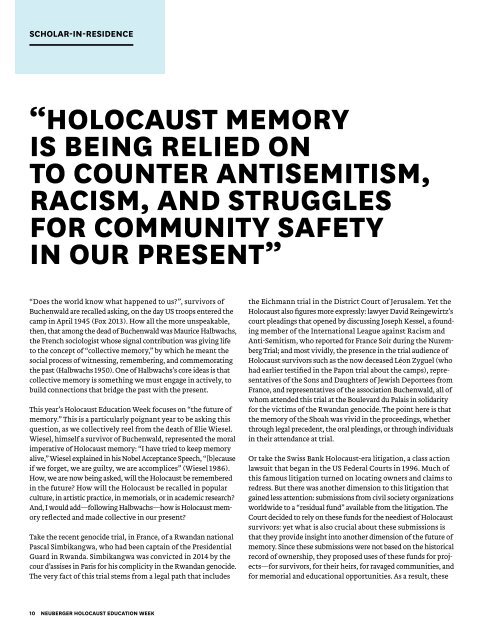2–9 November The Future of Memory
HEW-Guide-2016-72DPI
HEW-Guide-2016-72DPI
You also want an ePaper? Increase the reach of your titles
YUMPU automatically turns print PDFs into web optimized ePapers that Google loves.
scholar-in-residence<br />
“Holocaust memory<br />
is being relied on<br />
to counter antisemitism,<br />
racism, and struggles<br />
for community safety<br />
in our present”<br />
“Does the world know what happened to us?”, survivors <strong>of</strong><br />
Buchenwald are recalled asking, on the day US troops entered the<br />
camp in April 1945 (Fox 2013). How all the more unspeakable,<br />
then, that among the dead <strong>of</strong> Buchenwald was Maurice Halbwachs,<br />
the French sociologist whose signal contribution was giving life<br />
to the concept <strong>of</strong> “collective memory,” by which he meant the<br />
social process <strong>of</strong> witnessing, remembering, and commemorating<br />
the past (Halbwachs 1950). One <strong>of</strong> Halbwachs’s core ideas is that<br />
collective memory is something we must engage in actively, to<br />
build connections that bridge the past with the present.<br />
This year’s Holocaust Education Week focuses on “the future <strong>of</strong><br />
memory.” This is a particularly poignant year to be asking this<br />
question, as we collectively reel from the death <strong>of</strong> Elie Wiesel.<br />
Wiesel, himself a survivor <strong>of</strong> Buchenwald, represented the moral<br />
imperative <strong>of</strong> Holocaust memory: “I have tried to keep memory<br />
alive,” Wiesel explained in his Nobel Acceptance Speech, “[b]ecause<br />
if we forget, we are guilty, we are accomplices” (Wiesel 1986).<br />
How, we are now being asked, will the Holocaust be remembered<br />
in the future? How will the Holocaust be recalled in popular<br />
culture, in artistic practice, in memorials, or in academic research?<br />
And, I would add—following Halbwachs—how is Holocaust memory<br />
reflected and made collective in our present?<br />
Take the recent genocide trial, in France, <strong>of</strong> a Rwandan national<br />
Pascal Simbikangwa, who had been captain <strong>of</strong> the Presidential<br />
Guard in Rwanda. Simbikangwa was convicted in 2014 by the<br />
cour d’assises in Paris for his complicity in the Rwandan genocide.<br />
<strong>The</strong> very fact <strong>of</strong> this trial stems from a legal path that includes<br />
the Eichmann trial in the District Court <strong>of</strong> Jerusalem. Yet the<br />
Holocaust also figures more expressly: lawyer David Reingewirtz’s<br />
court pleadings that opened by discussing Joseph Kessel, a founding<br />
member <strong>of</strong> the International League against Racism and<br />
Anti-Semitism, who reported for France Soir during the Nuremberg<br />
Trial; and most vividly, the presence in the trial audience <strong>of</strong><br />
Holocaust survivors such as the now deceased Léon Zyguel (who<br />
had earlier testified in the Papon trial about the camps), representatives<br />
<strong>of</strong> the Sons and Daughters <strong>of</strong> Jewish Deportees from<br />
France, and representatives <strong>of</strong> the association Buchenwald, all <strong>of</strong><br />
whom attended this trial at the Boulevard du Palais in solidarity<br />
for the victims <strong>of</strong> the Rwandan genocide. <strong>The</strong> point here is that<br />
the memory <strong>of</strong> the Shoah was vivid in the proceedings, whether<br />
through legal precedent, the oral pleadings, or through individuals<br />
in their attendance at trial.<br />
Or take the Swiss Bank Holocaust-era litigation, a class action<br />
lawsuit that began in the US Federal Courts in 1996. Much <strong>of</strong><br />
this famous litigation turned on locating owners and claims to<br />
redress. But there was another dimension to this litigation that<br />
gained less attention: submissions from civil society organizations<br />
worldwide to a “residual fund” available from the litigation. <strong>The</strong><br />
Court decided to rely on these funds for the neediest <strong>of</strong> Holocaust<br />
survivors: yet what is also crucial about these submissions is<br />
that they provide insight into another dimension <strong>of</strong> the future <strong>of</strong><br />
memory. Since these submissions were not based on the historical<br />
record <strong>of</strong> ownership, they proposed uses <strong>of</strong> these funds for projects—for<br />
survivors, for their heirs, for ravaged communities, and<br />
for memorial and educational opportunities. As a result, these<br />
10 Neuberger Holocaust Education Week


